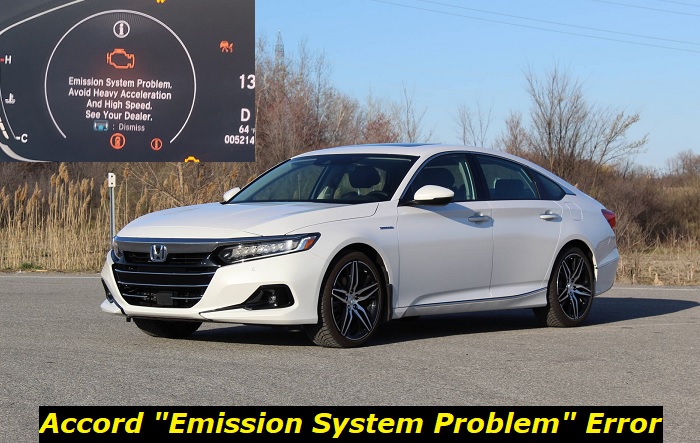Honda Accord drivers have reported a nagging emission system warning interrupting their new car experience. Alarmingly, the emission system warning has even appeared before the first thousand miles. If you are facing a similar situation with your Honda Accord, you are likely feeling frustrated - especially if the dealership has not been of much help.
Emission system problem message highlights
- Common reasons:catalytic converter problems, oxygen sensor faulty, issues with fuel combustion
- How to fix:read the codes, inspect the emission system units
- Possible consequences:you won't pass the fog test
- Priority level:High
- Can you drive?Yes
- DIY repair:Impossible
- Repair price range:$300-$1,500

This article has come to your rescue. It will discuss the prevalent emission system warnings shadowing Honda Accord drivers. Read on for accurate and concise information on the following:
- What the emissions system warning means
- Whether it is safe to drive when the emission system warning light comes on
- Possible reasons your emission system warning came on
What the Emission System Warning on your Honda Accord Means
When any warning light displays on your dashboard, it is natural to wonder whether your Honda Accord is safe to drive. The emission system warning light flashes on to inform you that the fuel-to-air ratio in your engine is improperly balanced. We will discuss the likely causes of the imbalance later on.
If the emission system warning light in your Honda Accord comes on but does not flash on or off, the issue is likely not very severe and does not need immediate attention. You can stick to your routine and inspect the car as soon as possible. When your emission system warning light flashes on and off, the situation is dire and calls for emergency attention.
Is It Safe to Drive Your Honda Accord Despite Emission System Warning Displaying?
An emission system malfunction in your Honda Accord does not pose any immediate risk to your safety. Nonetheless, a flashing warning light calls for immediate attention. You are advised to drive your Honda Accord to the nearest credible auto repair shop for emergency assistance.
The mechanics will let you know if your car is safe to drive, and if necessary, you can organize to have it towed from that location to your dealership or preferred auto repair expert. If your warning light is not flashing on and off, you have the luxury of scheduling an appointment with your dealership for diagnosis and repair.
You should not take too long to heed the emission system warning because the light may begin flashing due to exacerbating the original problem. Ignoring your emission system light is not advisable because your engine's components will suffer adverse effects the longer you take to attend to the problem. Dragging your feet will only rack up your repair bill as the problem spreads to other components.
Additionally, driving a car with an emission system malfunction could bring you into conflict with the law. Most states also make it illegal to drive a car with an emission system malfunctioning on public roads. Your Honda Accord will also be less efficient because the emission system malfunction will cause the following:
- A loss in fuel mileage
- A loss of power
- Poor handling and operation
- Rough idling
Causes of Emission System Warning in Your Honda Accord
The emission warning on your dashboard means that one or more of your Honda Accord's emission control systems may be defective or malfunctioning. Before you can solve your emission system warning, you must get to the bottom of what triggered it. There are various obvious suspects you should interrogate first whenever your Honda Accord gives you an emission system warning.
1. Faulty Mass Airflow Sensor
Most Honda Accord drivers suffering from the emission warning light problem discovered that the culprit was a faulty mass air flow sensor. The mass airflow sensor in your Honda Accord is tasked with increasing engine efficiency by ensuring the right amount of oxygen gets into your engine. This guarantees the ideal fuel-to-air ratio needed for flawless internal combustion.
Your mass airflow sensor may malfunction due to contamination after becoming clogged with dirt, debris, and moisture. A defective mass air flow sensor cannot effectively monitor the oxygen levels in your exhaust.
Wherever the sensor detects oxygen levels higher or lower than the optimal amount, it triggers your Honda Accord's electronic control unit to display the check emission system warning light. If your mass airflow sensor is behind your emission system warning light, you are also likely to notice the following symptoms:
- Increased fuel consumption
- Challenges starting the engine
- Trouble accelerating
- Rough idling and running
- Engine drag
Solution
Whether you need to clean, repair or replace your Honda Accord's mass air flow sensor, the task is fairly straightforward. Most auto enthusiasts can do it in their sleep. Cleaning the sensor calls for cotton swabs and electrical contact cleaner. After cleaning, ensure the cleaner has dried before reinstalling the sensor.
Installing the sensor involves unscrewing a few bolts, removing the plastic covering, and replacing the part. If you do not feel confident enough to tinker with your Honda Accord, there is no shame in relying on professionals who take great pride in their work.
Replacing a Honda Accord mass airflow sensor will cost anywhere between $250 and $450. The labor costs are highly subjective to your locality and mechanics' level of expertise.
2. Failing Fuel Injectors
Failing fuel injectors were known to cause emission system problems in the Honda Pilot. Though this problem is not as common in the Accord, it can't hurt to rule it out. If your fuel injectors are to blame for your emission system warning light, chances are the injectors are either leaking or have become unresponsive due to blockage.
The symptoms of clogged, dirty, or otherwise unresponsive fuel injectors are similar to those of a faulty mass airflow sensor. The most obvious sign of leaking fuel injectors is a strong smell of gas in the cabin. Stop driving your car immediately after you detect the smell. Ignoring the problem will likely result in your Honda Accord engine locking up.
Solution
Cleaning, repairing, and replacing fuel injectors are no walk in the park, even for experienced DIYers. The task is best left to qualified auto repair experts who can accurately diagnose and fix the problem. Whenever fuel injectors begin malfunctioning, it is best to replace them.
3. Damaged Catalytic Converter
A faulty catalytic converter is another leading cause of emissions system warnings in the Honda Accord. Your catalytic converter performs the crucial role of converting harmful gases from your engine into more environmentally friendly ones before releasing them into the environment. Your emission system warning light will come on immediately after the catalytic converter begins to fail.
Solution
This one is going to be a doozy. Your only option is to replace your catalytic converter. Since installing a new converter costs about $1,500 without factoring in labor costs, it is no wonder that some drivers opt to sell their cars rather than bother to solve this problem. It is advisable to have your converter replaced at the dealership to guarantee that high-quality OEM parts are used.
4. A Dirty Air Filter
Dirty air filters are often overlooked when diagnosing the cause of emission system warnings in the Honda Accord. Since your air filter is responsible for cleaning any air that gets into the engine, whenever it becomes clogged with dirt, problems are sure to arise when it restricts airflow. Restricted airflow to the engine due to a clogged air filter will likely trigger the electronic control unit to display the emission system warning light.
Solution
You can attempt to clean your air filter and reinstall it. However, replacement is the best path since it is a very simple, cheap, and durable solution. Purchasing and replacing your air filter is a simple DIY task. If you had rather call in the professionals, you are likely to spend $150 on parts and labor.
This list of causes is not exhaustive; a different component may have triggered your emission system warning light. Your emission system comprises various components, and any malfunction could trigger the emission system warning. The problem could also be caused by less likely factors, e.g., a valve leak in your ERG or a leak in your exhaust manifold.
Conclusion
The emission system is a vital component of your Honda Accord and should be cared for appropriately. Ensure you follow the service instructions in your owner's manual to ensure your emission system is not neglected or placed under undue strain. Whenever you see an emission system warning light, your goal should be to fix it as soon as possible. Any delay may cost you dearly by giving the defect time to spread to other components.
About the authors
The CarAraC research team is composed of seasoned auto mechanics and automotive industry professionals, including individuals with advanced degrees and certifications in their field. Our team members boast prestigious credentials, reflecting their extensive knowledge and skills. These qualifications include: IMI: Institute of the Motor Industry, ASE-Certified Master Automobile Technicians; Coventry University, Graduate of MA in Automotive Journalism; Politecnico di Torino, Italy, MS Automotive Engineering; Ss. Cyril and Methodius University in Skopje, Mechanical University in Skopje; TOC Automotive College; DHA Suffa University, Department of Mechanical Engineering






Add comment